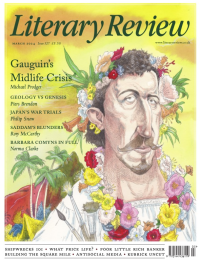Isaac Sligh
Georgia on His Mind
Hard by a Great Forest
By Leo Vardiashvili
Bloomsbury 338pp £16.99
The ancient city of Tbilisi – squeezed between cliffs and mountains into a winding valley along the banks of the Mtkvari River – has witnessed trade, conversion and invasion from every direction of the compass for the better part of two millennia. Strolling through the Old Town, one sees a cross-section of Georgia’s history, from a Zoroastrian fire temple and ancient Christian churches to examples of Soviet brutalism and garish modern casinos.
The city’s heady atmosphere of decay and effulgence has long called for effective treatment in an Anglophone novel, a challenge the British-Georgian writer Leo Vardiashvili takes up in his debut, Hard by a Great Forest. In this book, drawn in part from the author’s own background, we meet Saba, a young man who was smuggled out of civil-war-torn, post-Soviet Georgia in the early 1990s with his father, Irakli, and brother, Sandro, for a hardscrabble life in London. Saba’s mother, Eka, was left behind; Irakli scrimps and saves to get her out as well. A fellow Georgian, promising to help, betrays the family and runs off with their money. Eka passes away soon after.
When the main story begins in 2010, Irakli has just mustered up the courage to venture back to Tbilisi, where he promptly disappears. Sandro goes in search of him and disappears as well. And so, when Saba returns to his old homeland for the first time, it is in search of his family and answers about the painful past he left behind.
Saba befriends a Falstaffian taxi driver named Nodar, and together they search the city for clues left behind by Irakli and Sandro, dodging corrupt policemen and shadowy figures along the way. Irakli has hidden messages on pieces of paper in various places and Sandro has spray-painted graffiti riddles. One

Sign Up to our newsletter
Receive free articles, highlights from the archive, news, details of prizes, and much more.@Lit_Review
Follow Literary Review on Twitter
Twitter Feed
It wasn’t until 1825 that Pepys’s diary became available for the first time. How it was eventually decrypted and published is a story of subterfuge and duplicity.
Kate Loveman tells the tale.
Kate Loveman - Publishing Pepys
Kate Loveman: Publishing Pepys
literaryreview.co.uk
Arthur Christopher Benson was a pillar of the Edwardian establishment. He was supremely well connected. As his newly published diaries reveal, he was also riotously indiscreet.
Piers Brendon compares Benson’s journals to others from the 20th century.
Piers Brendon - Land of Dopes & Tories
Piers Brendon: Land of Dopes & Tories - The Benson Diaries: Selections from the Diary of Arthur Christopher Benson by Eamon Duffy & Ronald Hyam (edd)
literaryreview.co.uk
Of the siblings Gwen and Augustus John, it is Augustus who has commanded most attention from collectors and connoisseurs.
Was he really the finer artist, asks Tanya Harrod, or is it time Gwen emerged from her brother’s shadow?
Tanya Harrod - Cut from the Same Canvas
Tanya Harrod: Cut from the Same Canvas - Artists, Siblings, Visionaries: The Lives and Loves of Gwen and Augustus John by Judith Mackrell
literaryreview.co.uk